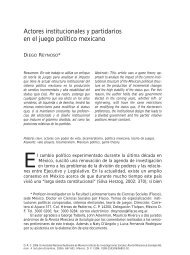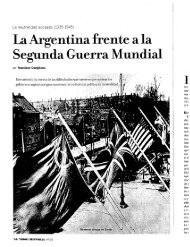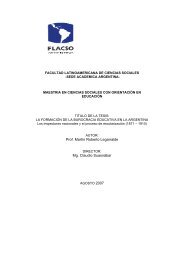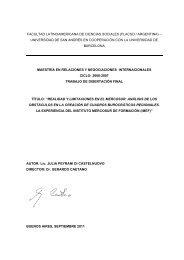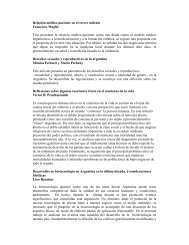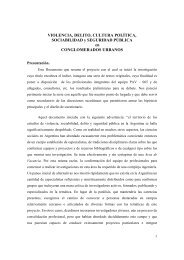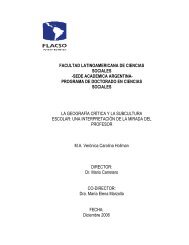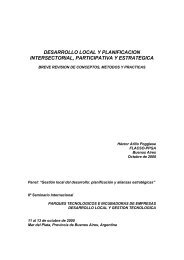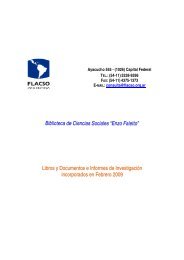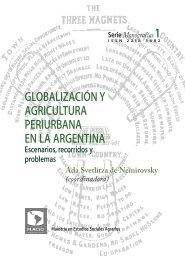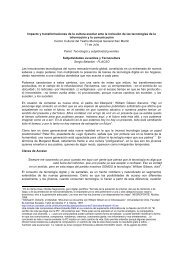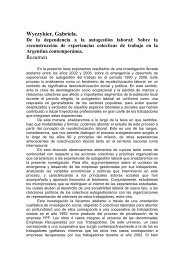Mercedes Botto Andrea Carla Bianculli - Flacso
Mercedes Botto Andrea Carla Bianculli - Flacso
Mercedes Botto Andrea Carla Bianculli - Flacso
Create successful ePaper yourself
Turn your PDF publications into a flip-book with our unique Google optimized e-Paper software.
When president Menem announced Mercosur and a rapid acceleration in the integration schedule –<br />
tariff reductions in five years instead of ten – he did not consult with business [Schneider, 2004].<br />
However, and given the lack of “local” studies and expertise, informal consultations were carried<br />
out with Chilean experts, who provided technical assistance in terms of the tariff policy and the two<br />
main options that were then on the agenda: the implementation of either a plain tariff or a tariff<br />
escalation scheme. Finally, the government opted for the tariff escalation, and its implementation<br />
would be done with the technical assistance of foreign experts as well. Apart from the technical<br />
challenge imposed by this decision, this also implied a political challenge both in terms of the<br />
participation of Argentina in the region and in the multilateral arena as well.<br />
During those years, regionalism and regional integration appeared as effective tools in order to<br />
facilitate entrance into a much more developed multilateral trading system. However, once again,<br />
two options were then on the agenda: the creation of either a free trade zone or a customs union.<br />
While the first option was clearly promoted by the Ministry of Economy on the basis that a free<br />
trade zone would allow for more manoeuvres in the negotiation of the foreign trade policy – a<br />
vision shared as well by certain business think-tanks such as Fundación Mediterránea and Centro de<br />
Estudios Macroeconómicos de Argentina (CEMA), the opposing option was the establishment of a<br />
customs union, an idea mainly promoted by public universities and the Economic Commission for<br />
Latin America and the Caribbean (ECLAC).<br />
Business participation in the negotiations for the establishment of the CET was mostly precluded<br />
given the opposition they would present to the proposed escalation tariff scheme16. The<br />
implementation of the trade liberalization program, which was intended to be universal and<br />
automatic, together with the creation of Mercosur led to a participation pattern mostly based on the<br />
pressure of groups seeking protection. At several times, business actors let government officials<br />
know of the necessity of establishing side payments and other compensatory mechanisms to restore<br />
balance and maintain the incentives for all parties to participate in free trade. On the one hand,<br />
these voices were never powerful enough to convince government officials to put the issue on the<br />
agenda. However, on the other hand, it is noteworthy that the Argentine government maintained<br />
the schedule to which it had committed, ignoring thus the claims and petitions put forward by the<br />
business sectors and lobbies who called either for specific exceptions or for a delay in the agreed<br />
schedule. Certainly, this is based on the fact that the CET provides a shield against domestic<br />
pressures for increased protection. Thus, no group can seek greater protection since the<br />
government cannot grant it without violating the CET, an instrument which is beyond domestic<br />
control.<br />
A tariff escalation scheme as the one proposed with the Mercosur CET appeared to be the most<br />
viable from a technical point of view, though its political significance was even greater. In spite of<br />
some delay on the original deadlines, the bloc finally achieved free trade amongst the member<br />
countries by 1999, when the CET would finally start to rule. The adoption of the CET would entail<br />
the commitment to a long-term political project with Brazil, which in turn would allow for a better<br />
16 The presence of tariff escalation means that processing industries benefit from higher levels of protection<br />
on their value added than is evident from the nominal tariffs alone.<br />
16




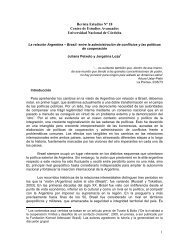
![[P] Disertacion.Melisa.Galvano.pdf - Flacso](https://img.yumpu.com/14596629/1/184x260/p-disertacionmelisagalvanopdf-flacso.jpg?quality=85)
